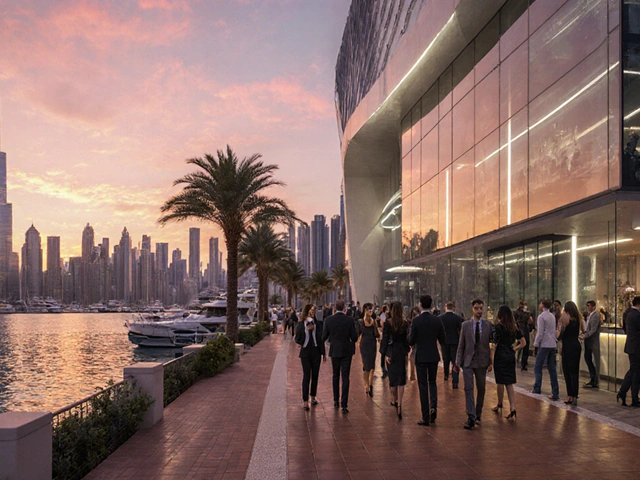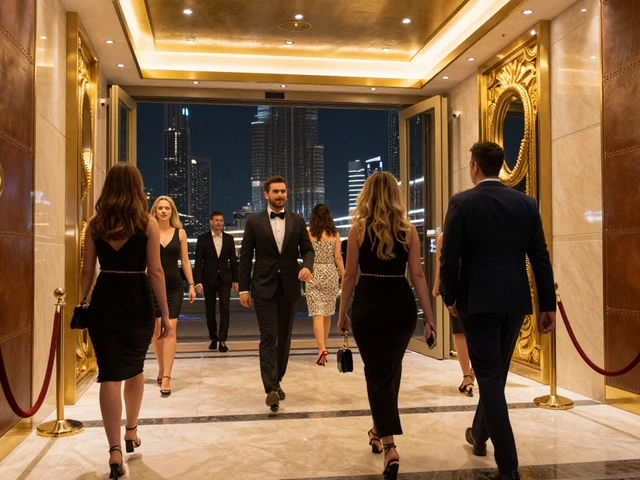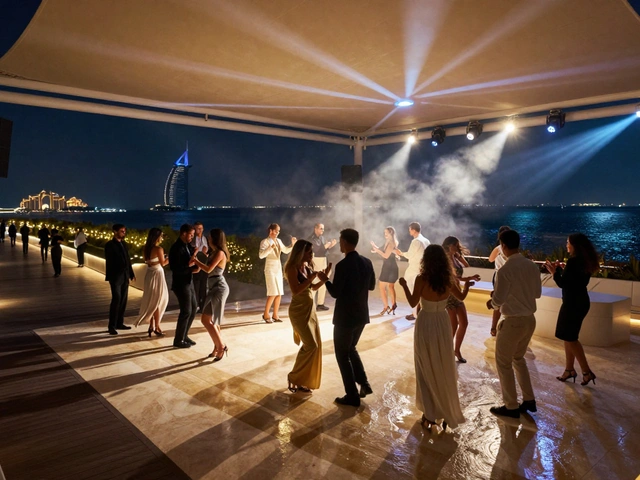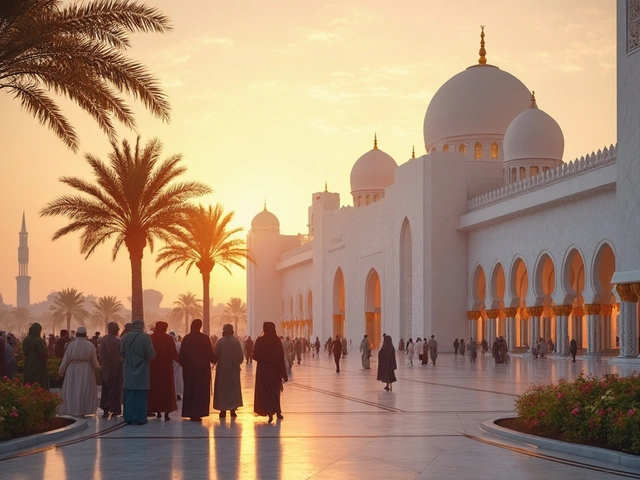Ever wondered how much more there is to Dubai than gleaming towers and fancy brunches? Jumeirah Mosque stands right in the city, open to everyone—not just Muslims. It’s almost hard to believe you can just show up in Dubai and walk into one of its most photographed mosques for a real chat about life, faith, and local traditions. And yes, you can actually ask all your burning questions.
No need to worry about the language barrier or feeling out of place. The guided experience is in English, and volunteers make it relaxed and free of pressure. It’s a rare chance to step into UAE culture beyond the typical sightseeing circuit. Most people living in Dubai—even expats or long-time residents—are surprised at how much they learn during this visit.
If you're interested in honest conversations, fresh insights about prayer, or simply want to understand what you see in every Dubai neighborhood, this stop will make a difference. Plan ahead: mornings tend to be cooler, and modest dress isn’t just polite—it’s expected. There’s even a modesty room where you can borrow abayas or kanduras at no cost. That small gesture sets the tone for what Jumeirah Mosque is all about: open doors, real respect, and meaningful moments.
- First Impressions at Jumeirah Mosque
- A Warm Welcome: Open Doors for All
- Inside the Tour: What Really Happens
- Practical Tips: Dress, Timing, and Etiquette
- Why the Mosque Matters to Dubai's Community
First Impressions at Jumeirah Mosque
The first thing you notice when arriving at the Jumeirah Mosque is how it stands out even among Dubai’s constant flow of glass towers and flashy malls. Sitting right off Jumeirah Beach Road, it’s central and accessible—parking is right outside, and RTA buses stop nearby, which is rare for major old landmarks in the city. The mosque’s white stone walls catch the morning sun, making the place feel calm and inviting from the street. You see locals, tourists with cameras, expat families, and sometimes even school trips, all mixing together on the steps before the tour starts.
The Jumeirah Mosque is famous for being one of the few mosques in Dubai open to non-Muslims for guided visits. The structure follows classic Fatimid style, which comes from Egypt, with twin minarets and a large dome. It’s not the largest mosque in the UAE, but it’s definitely one of the most welcoming. Tours are organized by the Sheikh Mohammed Centre for Cultural Understanding (SMCCU) and happen six days a week except Fridays, kicking off at 10 am sharp. Arrive ten minutes earlier to sign in and grab an Arabic coffee or sweet at the entrance tent.
To give a sense of how busy it can get, here’s a breakdown of average visitor stats (pre-pandemic numbers):
| Day | Average Guests |
|---|---|
| Saturday | 120 |
| Sunday | 90 |
| Monday | 80 |
| Tuesday | 85 |
| Wednesday | 90 |
| Thursday | 100 |
Right from the start, there’s a communal vibe. Staff greet you with a “Salaam Alaikum” and let you explore the shaded courtyard while you wait. Kids have space to wander (and ask questions—Callum was obsessed with the big fountain one time), and if you forgot to dress modestly, the volunteers sort it out on the spot; abayas and kanduras come freshly laundered every morning. Take a second to look up—there are palm trees and views of city skyscrapers peeking through, which is such a typical Dubai scene. You realise straight away: this mosque visit isn’t just about religion. It’s a real connection point for anyone curious about the city, its people, and what really matters to Dubai life.
A Warm Welcome: Open Doors for All
Not every mosque in Dubai opens its doors to visitors of all backgrounds, but Jumeirah Mosque does it every single day except Fridays. This place runs the famous “Open Doors. Open Minds.” program—there’s nothing exclusive about it. Whether you’re a longtime Dubai resident, a tourist stopping by from Deira, or someone who just moved to a villa in Jumeirah, you’re truly welcome here.
The main gig happens at 10:00 am, and you don’t even need to book ahead—just walk up to the Majlis right before the tour. Volunteers from the Sheikh Mohammed Centre for Cultural Understanding (SMCCU) guide the session and make sure everyone feels comfortable. All questions are fair, from “How do you pray?” to “Why do you break your fast with dates?”
Here’s a quick look at what makes the Jumeirah Mosque visit different from most places:
- Guided experience in English, with simple explanations
- Coffee, tea, and dates served before the talk
- No pressure to know anything about Islam—all faiths and none are welcome
- Kids can come along, so families don’t have to worry
- Borrowing traditional attire is free (no extra fees tacked on)
The SMCCU says around 70,000 people joined the mosque tours in the last couple of years, which shows how much both Dubai locals and visitors value this honest exchange.
| Program Days | Tour Start Time | Cost | Language |
|---|---|---|---|
| Saturday - Thursday | 10:00 am | AED 35 (kids under 12 free) | English |
What stands out is the simple, open attitude—you’re encouraged to ask anything. There’s no script or hard sell. If you want to understand how faith fits into daily Dubai life, this is the real deal. No fancy booking platforms, no stressful queues, and absolutely no judgment.
By the time you leave, chances are you’ll have a better grasp of how Dubai blends tradition and hospitality. It’s only one morning out of your week, but it sticks with most people much longer.
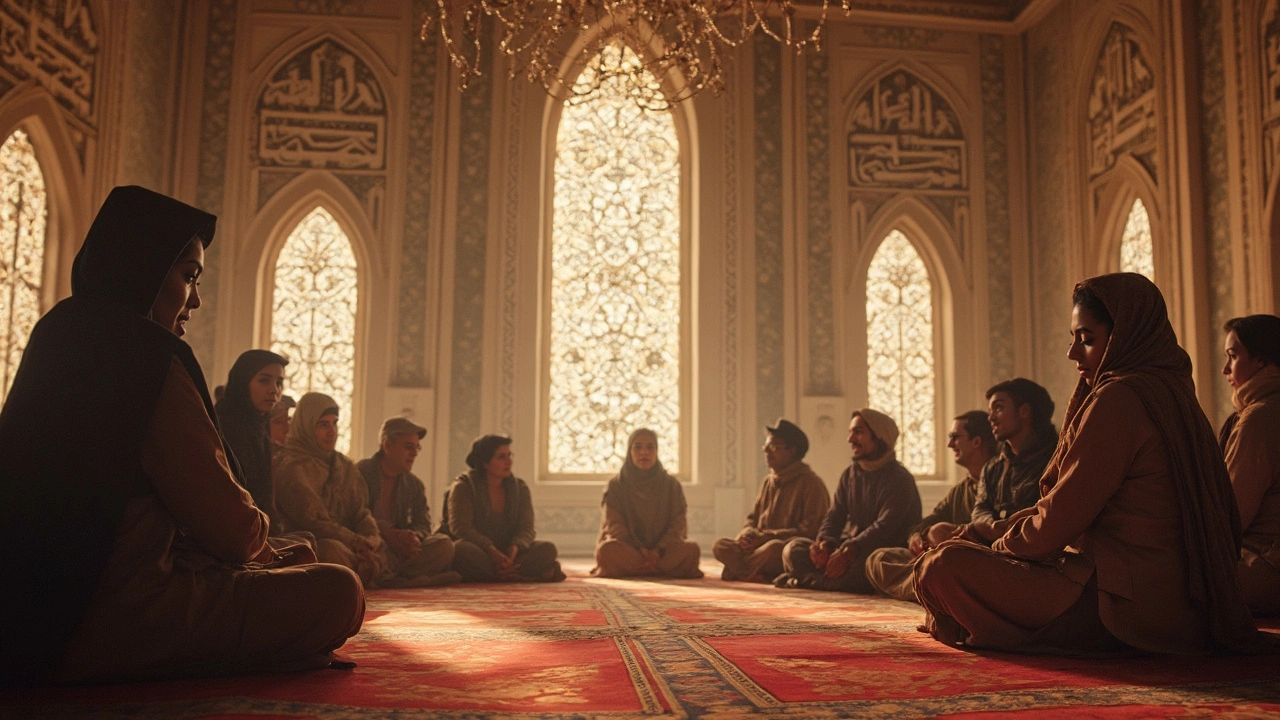
Inside the Tour: What Really Happens
The first thing to know about the Jumeirah Mosque tour is you don’t just wander around looking at architecture; you actually get to talk, ask questions, and learn how everything works. Tours run through the “Open Doors. Open Minds.” program by the Sheikh Mohammed Centre for Cultural Understanding, which means forget any lecture—it feels more like an honest, friendly chat.
It kicks off in the main prayer hall. Right up front, the guide explains basic facts: this mosque holds up to 1,200 people, and it’s built using classic Fatimid style from Egypt. You’ll hear about the five pillars of Islam while actually seeing where daily prayers happen, with no question too basic or off-limits. In my group, kids and adults both asked about what men and women do differently in prayer, whether you can snap photos (yes, except during prayer), and why everyone leaves their shoes at the door.
Expect to learn by doing—visitors sometimes try washing hands and feet in the ablution area. There’s a quick demo of traditional greetings, plus a look at common Emirati foods served with Arabic coffee and dates. It’s not just about staring at old walls; you’ll get real snacks and hear about daily life in Dubai from people who actually live here.
Throughout, the conversation stays open and friendly. As the guide says:
"We believe every question is a good question when it comes to learning about each other."
— Sheikh Mohammed Centre for Cultural Understanding
If you like stats, here’s a quick snapshot of how the tours usually run:
| Detail | Fact |
|---|---|
| Tour Duration | 75 minutes |
| Group Size (avg.) | 20–40 people |
| Language | English (Arabic on request) |
| Photo Allowed? | Yes (except prayer time) |
| Refreshments | Arabic coffee, dates, local pastries |
Bring your curiosity. Whether you practice any faith or none at all, you’ll walk away actually understanding daily mosque life, local customs, and why this place means so much in Dubai. If you want hands-on knowledge of the city beyond the malls and beaches, this is the stop that delivers it.
Practical Tips: Dress, Timing, and Etiquette
Got your eyes on Jumeirah Mosque for your next Dubai outing? Some simple prep makes the visit a breeze. When it comes to dress, both men and women need to go for modest clothing. That means long pants or skirts, and tops with sleeves—nothing see-through or tight. Women should cover their hair with a scarf or shawl. Luckily, if you rush over straight from work or the beach and don’t have the right clothes, the mosque has got your back. They provide abayas for women and kanduras for men, totally free, no awkward questions.
Timing can make or break your experience. The guided tours happen daily, except on Fridays, and they kick off at 10:00 am sharp. Try to arrive at least 15 minutes early. Dubai can get hot fast, so mornings are the best bet—not just for weather, but for fewer crowds too. Parking at the mosque is usually easy, but ride-hailing apps like Careem and Uber get you right to the door if you’re avoiding the hassle.
Now, a few ground rules: once inside, respect is key. Turn your phone on silent and avoid snapping selfies during prayer times. Always ask before taking close-up photos of people. If you’re wondering whether to bring your kids, don’t stress—youngsters are welcome, just ask them to keep voices down as a sign of respect. During the Q&A, be open but polite—no question is silly, but respectful language goes a long way.
- Jumeirah Mosque tours are open to all, but only registered service animals are allowed inside.
- There’s a designated shoe area, as you’ll need to remove your shoes before stepping inside.
- Water is provided, but snacks aren’t—grab a bite at one of the cafes along Jumeirah Beach Road before or after your visit.
Following these tips will help you settle in and focus on what really matters—getting to know Dubai in a whole new way.

Why the Mosque Matters to Dubai's Community
Jumeirah Mosque isn’t just a pretty building on postcards—it’s a real hub for people living in, working in, or visiting Dubai. For starters, this place stands out because it’s one of the few mosques in the UAE that welcomes non-Muslims in daily. Imagine that, in a city where almost 85% of the population are expats from all over the world. Opening the mosque up for everyone every day isn’t just a token gesture. It’s about building bridges in a city packed with diversity.
The mosque’s guided tours, run by the Sheikh Mohammed Centre for Cultural Understanding (SMCCU), are famous for their no-judgment Q&A sessions. This is where myths get busted—about Islam, prayer, Ramadan, even those little coffee cups you see everywhere. The vibe is friendly, not preachy, and that breaks down a lot of walls. Many visitors say these talks helped them finally understand what’s going on when Friday prayers fill Dubai’s streets, or why the call to prayer sounds different in each corner of the city.
Down at the community level, the mosque supports neighborhood events, school visits, and Ramadan Iftar gatherings. It opens up to local schools for field trips so kids—whether they’re Emirati or expat—can see faith in real life, not just in a textbook. Plus, during Ramadan, families can join communal Iftars on the mosque grounds, no matter their religion.
- SMCCU holds about 5,000 tours a year at the mosque—most are filled to capacity.
- Volunteers are local Dubai residents, so you get real local insight, not tourist-script answers.
- During the holy month of Ramadan, tents can accommodate hundreds of guests per evening for free meals.
It’s not just a mosque for prayers; it’s a local landmark where big issues—like religious tolerance and cultural mixing—get tackled in everyday language. That’s probably why so many expats stick it high on their Dubai bucket list and why Emiratis see it as a point of pride.
| Fact | Details |
|---|---|
| Mosque Opening Year | 1979 |
| Location | Jumeirah Beach Road, Dubai |
| Prayer Space Capacity | Up to 1,200 worshippers |
| Guided Tour Days | 6 days a week, except Fridays |
| Tour Language | English |
If you’re living in Dubai or just passing through, the Jumeirah Mosque experience makes it easier to get where locals are coming from, no matter where you grew up. It’s this mix of openness and tradition that helps keep Dubai connected as its community grows and shifts every year.



